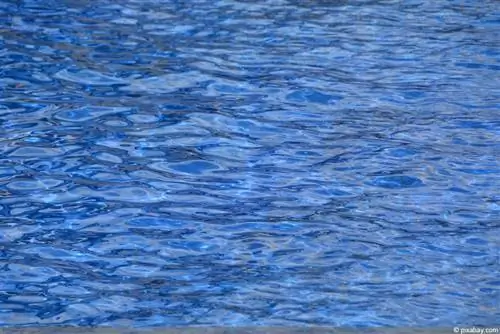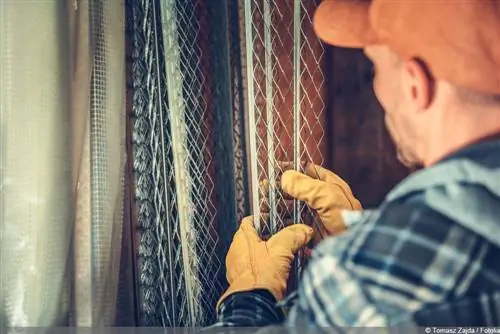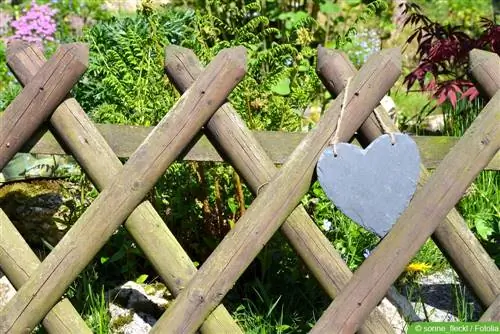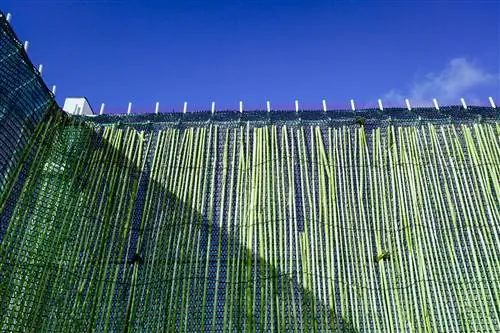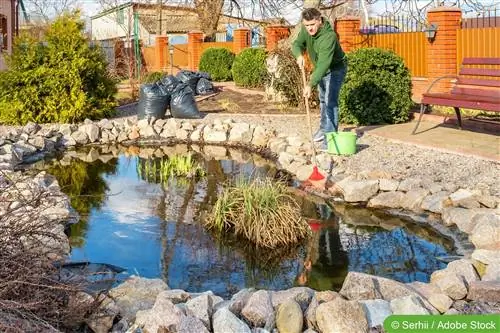- Author admin caroline@plants-knowledge.com.
- Public 2023-12-17 03:39.
- Last modified 2025-01-24 12:45.
Glass fences are for many people an interesting alternative to conventional materials such as the classic wood, PVC or metal. A big advantage of glass fences is that they are insensitive to fungi or climbing plants, which can cause serious damage, for example. Thanks to the smooth surface, cleaning is quick and effective. Thanks to the element construction offered today, the acquisition costs are kept quite low.
Cost of a glass fence
In the past, glass fences weren't really affordable because they had to be designed by an architect. More and more manufacturers are offering individual glass fence elements in numerous variations, which you can even purchase at hardware stores. This keeps the costs lower than is often expected and the installation is also quite easy in this way, as you only have to set up individual elements and connect them together. The elements are often offered in the following dimensions:
- rectangular: 180 cm x 90 cm
- rectangular: 180 cm x 120 cm
- rectangular with slant: 180 cm x 90 cm; Sloping starts at 90 cm height
There are no other sizes for finished elements. The further height of the fence is determined by the fence posts that support the glass fence in the garden. This can even be used to reach heights of 2.5 meters. Another advantage is the possibility of using short fences with a maximum height of 90 cm. To do this, the fences are simply taken across and installed accordingly. This gives you the freedom to choose how high and wide the fence will be. The prices do not necessarily depend on the size, but on the decoration and the glass structure. Clear fences are the cheapest and harder to clean than those with privacy screens or ceramic digital printing. The prices for an element measuring 180 cm x 90 cm x 0.8 cm in different versions:
- clear toughened safety glass: 90 to 110 euros per element
- Toughened safety glass with sandblasting (one-sided) and optional color: 130 to 180 euros per element
- Laminated safety glass with digital printing (ceramic): 230 to 280 euros
For slanted variants you have to expect an average of 30 euros more per variant. In total, the costs for the elements are 90 to 280 euros per meter of length, and for slanted versions 120 to 310 euros. Of course, you also need to purchase accessories. The costs for this at a glance:
- Posts: 20 to 50 euros per piece depending on the design
- Clamping rails: 20 to 50 euros per piece depending on the design
- Clamp holder: 10 to 15 euros per piece
- Post caps: 2 to 3 euros per piece
- Consoles: 20 to 30 per piece
On average, depending on the system used (concreting or dowelling), the costs for an element are between 300 and 450 euros. This depends heavily on the design. So you would have to pay between 900 and 1,350 euros for three elements. Complete sets can also be ordered, which can reduce costs by 10 to 15 percent. The costs for delivery and possible assembly differ greatly from provider to provider. You should inquire here beforehand. Fences that are set in concrete are usually cheaper, but of course you also have to factor in the costs of a foundation. Dowel systems are more expensive to purchase, but do not require a cast foundation.
Cleaning
Cleaning a glass fence is quite easy compared to other materials, as neither mold, plants nor dirt can stick to or spread over the material for a long time. You can clean even large glass fences within a short period of time and enjoy the visibility once dirt, fingerprints or dried rain have finally disappeared. The best thing: You don't need any special cleaners for cleaning, as commercially available products for windows and glass often cause more streaks than desired. The following list gives you an overview of the utensils you need to make your glass fence shine:
- Soft sponge or window squeegee with sponge
- Organic dishwashing liquid
- alternative puller
- alternatively glass scraper
- clean tea towel
- Gloves
The glass scraper is needed if there are stains on your glass fence that cannot be removed with the sponge alone. When choosing a sponge, make sure that it does not contain steel wool and is soft. This is completely sufficient for cleaning. Organic dishwashing liquid is important because the fence connects directly to your garden and you certainly don't want chemicals getting into your plants' substrate or the soil. The timing of cleaning depends on the weather in the region. Particularly dry regions with a lot of dust can quickly dirty the glass, as can rain, which carries dirt with it. The following intervals have proven to be effective:
- normal weather: every 6 months (spring and autumn)
- humid or dusty weather: every 4 months (March, July, November)
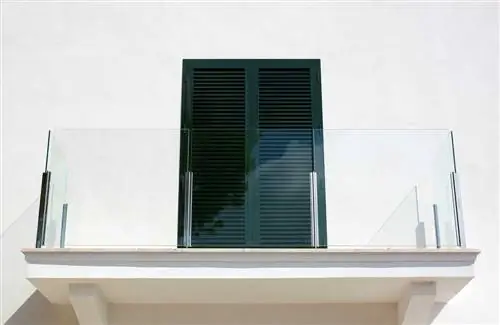
Of course, you can clean your fence more often, especially if you live close to a source of dirt. Even larger roads can quickly cause the glass to become cloudy due to exhaust fumes and particles thrown up. It is therefore advisable to clean the fence more often, especially over the summer. In winter you can skip cleaning and it is best to start cleaning in March. From March to November, the majority of dirt accumulates, which is not the case in winter. Therefore, you can safely avoid cleaning during the cold season. Of course, larger stains that appear suddenly should be cleaned up immediately, especially if they involve sticky substances.
Tip:
When cleaning the glass fence, be sure to avoid using a high-pressure cleaner, as is recommended in many online forums. Although glass fences are robust against wind and weather, even small scratches or damage can cause the pane to break completely due to the high water pressure.
Cleaning glass fence: instructions
As soon as you have the cleaning utensils at hand, you can get started. To do this, choose a day when the sun is shining because then the fence can dry on its own. This not only saves you work and time, it also prevents streaks. You should also contact your neighbors if the fence is directly adjacent to their property and you would have to enter it to clean. A glass fence only looks good if it is clean on both sides. Even if you choose a variant that is colored or patterned on one side, this is necessary. Ideally, you have placed your fence so that you always have room to clean. Follow these instructions to effectively clean your glass fence:
- Make soapy water
- A bucket or large container is ideal for this
- Dosage depending on the degree of contamination
- the dirtier, the more detergent you use
- Dip a sponge or window squeegee in soapy water
- wring well
- clean one element at a time
- this will prevent the cleaning agent from drying out
- rinse with clean water
- use a watering can or garden hose
- Let the fence air dry afterwards
- this is particularly good on sunny days
- otherwise help with tea towels
- also clean connecting pieces and edges
- Brackets can be cleaned with a brush
- After drying, check the glass fence for dirt
- work on stubborn stains with a glass scraper
- set flat to avoid scratching glass
Glass fences are not difficult to clean, even in large versions, and provide a pleasant change compared to wooden, PVC or metal fences. Of course, you could hire a cleaning service, but in the long run this may turn out to be more expensive than expected.
Tip:
Don't forget to check your glass fence regularly throughout the year for bird droppings or urine, for example from dogs or cats. Such excretions can eat into the glass over a longer period of time and leave unsightly spots that need to be completely filled up.
Surface treatment
Alternatively, you can use a surface or nanocoating. These products are liquid agents that are applied directly to the glass and ensure that rain rolls off and dirt has difficulty adhering. These are used for showers, car windows or pool barriers, but their properties make them ideal for glass fences. One liter is enough for around 30 square meters of windows and costs between ten and 15 euros. This can save you time and effort as the fence needs to be cleaned much less often. These coatings are applied in the following way:
- Treat glass with alcohol-based cleaner
- Apply agent thinly using a spray bottle
- leave to work for a certain period of time according to the manufacturer’s instructions
- then polish by hand or polishing machine
Such impregnation is particularly recommended for long glass fences, as they can absorb significantly less dirt.


